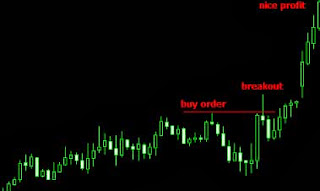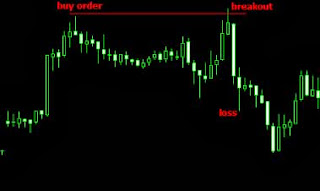A breakout happens when the price breaks a significant high and makes a new high. This is the
definition. It looks simple. Most traders are trying to catch these breakouts and make money on the accelerated
price move. A so-called momentum trader places his buy-stop order just above the significant high. He
is waiting for this high breakout... If there is no breakout, he cancels his buy-stop order and prepares for
the next trade. If the breakout happens and his buy-stop target is filled, his trading platform
automatically opens a long position. The same holds for a low breakout (in that case, trader would
place a sell-stop order). Why traders are doing that? Because the price action typically accelerates after
a breakout and results in a nice profit. But it's not so sweet every time. There is a risk of significant
loss. The nightmares of momentum traders are “false breakouts” and they happen too often. Let's
explain why.
The secret behind false breakouts
Let's discuss the false high-breakouts (the same holds for low-breakouts). There are times when price
breaks a significant high, a buy order is filled, long position is opened, but the price quickly turns back
down and never comes up or Stop Loss is filled. The trader has to exit position with a loss. Small losses
are not something unusual. Every professional trader has losses in Forex trading, you have to admit it.
But a profitable trader wins more than loses after time. We have tested some breakout systems on all
major currency pairs ten years back. Most of the breakouts were false breakouts or resulted in a small
profit. Any system that relies purely on breakouts does not work consistently. Since we, Tim and Julie,
are in the financial markets for more than ten years, we have collected some sort of information the
large banks and corporations do not want you to know.
A large bank has enough money to move the market for a while.
When the price hits the
significant high again, it should normally bounce back from this high forming a double top pattern. But
momentum traders would go long when a breakout happens - it is the well known practice explained in
previous paragraph. When the price comes close enough to the high, traders inside the bank quickly
buy a large volume of one currency pair ($ millions!). They move the market a few pips up and a
forced breakout happens! There is a bunch of buy-orders lying just above the high and these orders get
filled immediately. Then the market moves some additional pips up because of the new long positions.
After that the bank happily closes its own large position (sells the millions back) and the price quickly
turns back. The banks “earn” great amount of money doing this unfair business. They do it a few times
every day.
Julie comes with a genial solution:
Enter the breakout before the crowd!
Julie experimented with the CCI indicator (Commodity Channel Index) in the Forex market years ago.
There are two common lines: +100 line and -100 line on the indicator chart. When CCI crosses (or
“breaks”) the 100 line upward, it is a good entry signal to go long. When CCI crosses (or “breaks”) the
-100 line downward, it is a good entry signal to go short.
Good signal means that the probability of winning dramatically increases. In other words –
CCI indicator acts like a filter for spotting winning trades. Not only a filter. It gives an opportunity to
enter the market before a breakout! There was a hard work in developing a definite profitable strategy
based on this knowledge. Our strategy is easy to use and gives impressive results. With our students,
we made a fortune in the years 2006 and 2007 starting with less than one thousand dollars. We will
give our knowledge to you in the next chapters.
Subscribe to:
Post Comments (Atom)



ReplyDeleteLearn Forex trading basics and all kinds of strategies from Fxlingo.com because they offer free forex videos for the beginners.They also help you to find a good forex broker that meets your expectations.
Forex trading Tips
Fx Trading Strategies
Forex Trading Basics